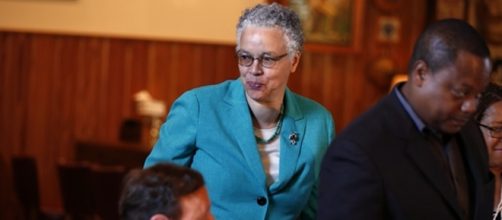While Chicago and Cook County elected Democrats remain smugly confident that Republicans can't win in their districts despite the Southside neighborhoods erupting into war zones, a Democratic sponsored state tax hike, and unfunded, bankrupt city and state school and government-worker pension plans, a brand-new soda-Pop Tax has voters' undivided attention.
New soda tax hits low-income voters
Described by the Chicago Times yesterday as a “deeply unpopular county pop tax” piled on top of recent state and city tax increases, the beverage tax hits all citizens, even those who aren’t used to paying taxes.
During Cook County Democrats' endorsement session for next year's primary season, Board president Toni Preckwinkle was asked by Rep. Luis Arroyo if she intended to repeal the soft drink tax, a measure of the pop-tax's disapproval rating with voters.
Trifecta of city, county state tax increases
Normally, Chicagoans and Cook County residents don’t put up much of a fuss about taxes, perhaps because it’s a one-party town with little Republican representation to thwart tax increases. However, Democratic state legislators recently overrode Republican Gov. Bruce Rauner's veto of a State Income Tax rate hike, which raised the Illinois state tax from 3.75 percent to 4.95 percent. Unfortunately for taxpayers, that state income tax hike was little more than a desperate attempt to balance budgets for monies long spent.
The new pop tax hits financially-strapped Chicagoans who don’t usually have to pay state and federal income taxes, a group that has joined forces with the state's anti-tax roast simmering in the electoral crock pot next to the freshly taxed bottle of pop.
As for Preckwinkle’s response to Arroyo's question about repealing the pop tax, she fully supports the tax increase, citing the potential layoff of about 1,100 government workers that politicos like her would need to implement without the new tax on cold drinks. "My answer is no," Preckwinkle responded.
"We had a choice last fall, either raise revenue, or make 1,100 cuts in personnel and lay off 1,100 people, and I thought then, I think now, that would severely impact the quality of services," said Preckwinkle, as quoted in the Chicago Tribune story published yesterday.
Nevertheless, representatives and other elected officials at the meeting that have to face voters next year seemed dismayed and confused about voter backlash some claim to be experiencing. "People at the grocery store are asking me why I voted for it," said one recently elected Democrat. Democratic Party members at the meeting expressed fears that a trifecta of new taxes levied by the city, county and state, all coming at about the same time, could work against Democratic campaigns.
Politicians hope voters move on
Another Democrat at the meeting attempted sooth the politicians' concerns by suggesting that voters have a short memories and by the time the “rubber hits the road” on this, people will have moved on.
But still more said the new soda tax will hit Democrats at the ballot box in 2018. Nevertheless, we are talking about Chicago and the Democrats are simply wringing their hands, not voting against the new taxes. While elected officials like Northwest Side Ald. Nicholas Sposato, who said there will be some backlash against the pop tax "down the road in the election next year", most Democrats in attendance seem to understand that their government pensions come first, that is after all the golden goose of Chicago and by default, Cook County Democrats.


